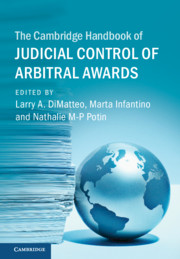16 results
Part IV - Judicial Control of Arbitral Awards
-
- Book:
- The Cambridge Handbook of Judicial Control of Arbitral Awards
- Published online:
- 08 October 2020
- Print publication:
- 29 October 2020, pp 149-414
-
- Chapter
- Export citation
Contributors
-
- Book:
- The Cambridge Handbook of Judicial Control of Arbitral Awards
- Published online:
- 08 October 2020
- Print publication:
- 29 October 2020, pp xxiii-xxvi
-
- Chapter
- Export citation
Part V - Summary and Findings
-
- Book:
- The Cambridge Handbook of Judicial Control of Arbitral Awards
- Published online:
- 08 October 2020
- Print publication:
- 29 October 2020, pp 415-416
-
- Chapter
- Export citation
Part III - Scope and Interpretation of Arbitration Clauses
-
- Book:
- The Cambridge Handbook of Judicial Control of Arbitral Awards
- Published online:
- 08 October 2020
- Print publication:
- 29 October 2020, pp 97-148
-
- Chapter
- Export citation
Dedication
-
- Book:
- The Cambridge Handbook of Judicial Control of Arbitral Awards
- Published online:
- 08 October 2020
- Print publication:
- 29 October 2020, pp v-vi
-
- Chapter
- Export citation
3 - Exploring the Parameters of Conflicts of Interest
- from Part I - Vacating Commercial Arbitration Awards
-
-
- Book:
- The Cambridge Handbook of Judicial Control of Arbitral Awards
- Published online:
- 08 October 2020
- Print publication:
- 29 October 2020, pp 29-53
-
- Chapter
- Export citation
Part II - Enforcing Commercial Arbitration Awards
-
- Book:
- The Cambridge Handbook of Judicial Control of Arbitral Awards
- Published online:
- 08 October 2020
- Print publication:
- 29 October 2020, pp 69-96
-
- Chapter
- Export citation
Part I - Vacating Commercial Arbitration Awards
-
- Book:
- The Cambridge Handbook of Judicial Control of Arbitral Awards
- Published online:
- 08 October 2020
- Print publication:
- 29 October 2020, pp 1-68
-
- Chapter
- Export citation
25 - Divergence, Themes, and Trends in National Arbitration Laws
- from Part V - Summary and Findings
-
-
- Book:
- The Cambridge Handbook of Judicial Control of Arbitral Awards
- Published online:
- 08 October 2020
- Print publication:
- 29 October 2020, pp 417-442
-
- Chapter
- Export citation
1 - Introduction
- from Part I - Vacating Commercial Arbitration Awards
-
-
- Book:
- The Cambridge Handbook of Judicial Control of Arbitral Awards
- Published online:
- 08 October 2020
- Print publication:
- 29 October 2020, pp 3-11
-
- Chapter
- Export citation
Copyright page
-
- Book:
- The Cambridge Handbook of Judicial Control of Arbitral Awards
- Published online:
- 08 October 2020
- Print publication:
- 29 October 2020, pp iv-iv
-
- Chapter
- Export citation
17 - Judicial Control of Arbitral Awards in Nigeria
- from Part IV - Judicial Control of Arbitral Awards
-
-
- Book:
- The Cambridge Handbook of Judicial Control of Arbitral Awards
- Published online:
- 08 October 2020
- Print publication:
- 29 October 2020, pp 275-291
-
- Chapter
- Export citation
Contents
-
- Book:
- The Cambridge Handbook of Judicial Control of Arbitral Awards
- Published online:
- 08 October 2020
- Print publication:
- 29 October 2020, pp xi-xxii
-
- Chapter
- Export citation
Concise Contents
-
- Book:
- The Cambridge Handbook of Judicial Control of Arbitral Awards
- Published online:
- 08 October 2020
- Print publication:
- 29 October 2020, pp vii-x
-
- Chapter
- Export citation
Preface
-
- Book:
- The Cambridge Handbook of Judicial Control of Arbitral Awards
- Published online:
- 08 October 2020
- Print publication:
- 29 October 2020, pp xxvii-xxviii
-
- Chapter
- Export citation

The Cambridge Handbook of Judicial Control of Arbitral Awards
-
- Published online:
- 08 October 2020
- Print publication:
- 29 October 2020



